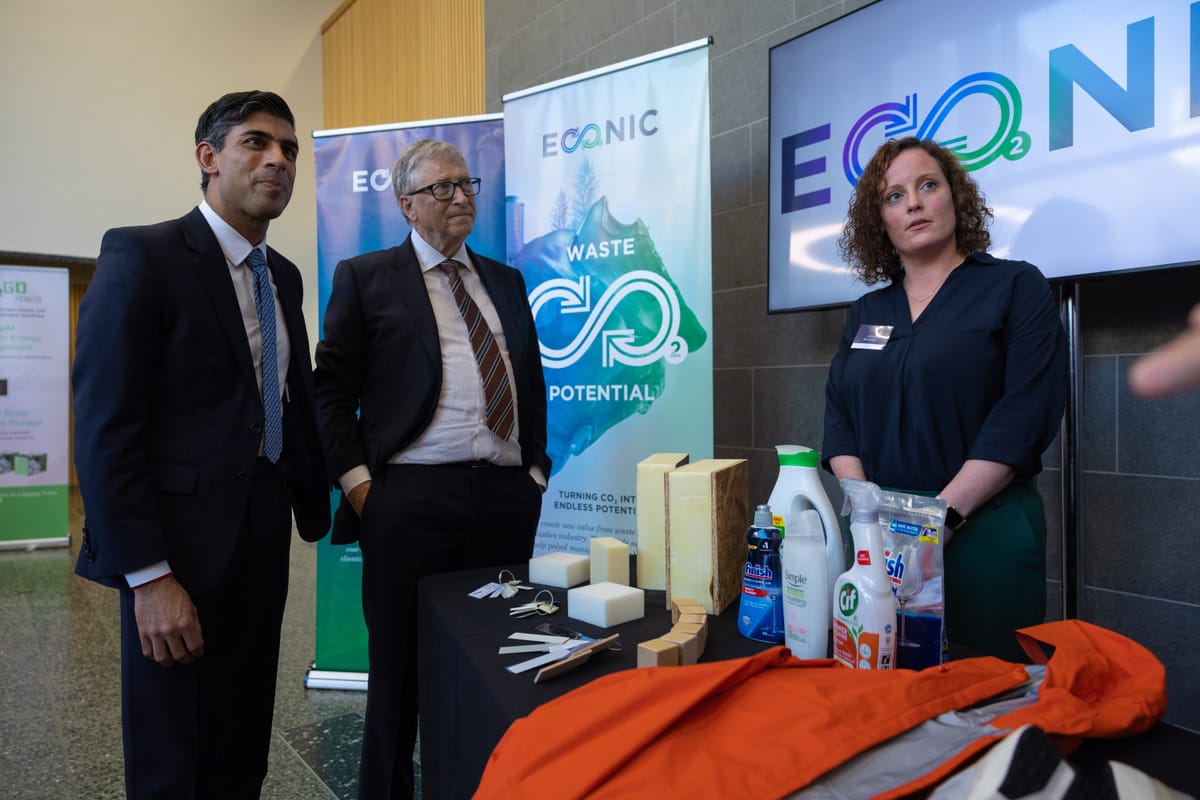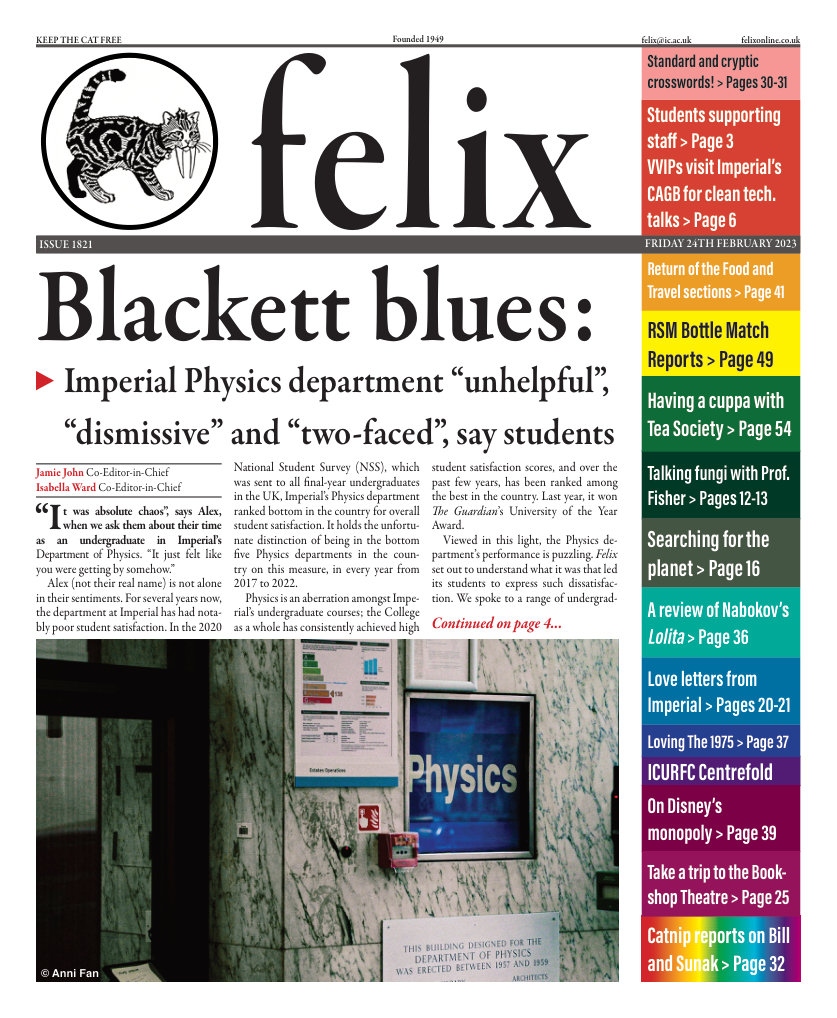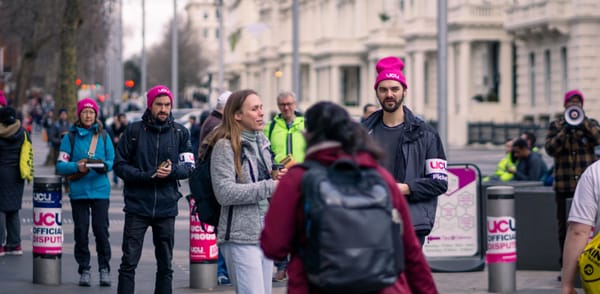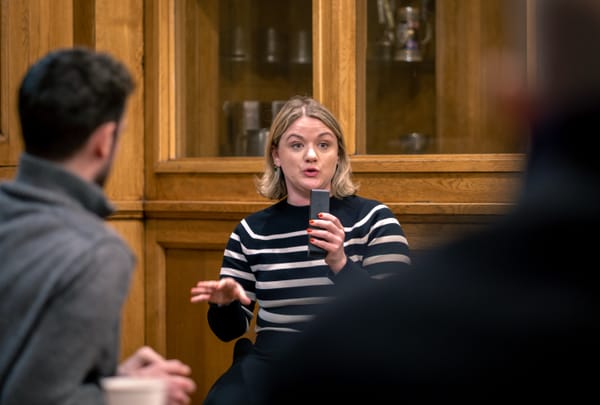Launch of Cleantech for UK draws big names to South Kensington campus
Rishi Sunak and Bill Gates launch Cleantech for UK, co-founded by Imperial climate accelerator ‘Undaunted’.

At approximately 3pm on Wednesday 15th February, crowds of students and staff began to form outside various entry points to Imperial Business School and the City and Guilds Building (CAGB). This followed circulation around campus of reported sightings - via group chats, social media, and word of mouth - of Microsoft founder Bill Gates and UK Prime Minister Rishi Sunak with Imperial College President Hugh Brady and Vice Provost for Research and Enterprise Professor Mary Ryan.
Many people were wondering what brought the pair of VIPs to the university, and the following comment from Brady might answer just that question. He stated that “achieving net-zero will require an enormous step-change in our economy, industry, and civic systems. Imperial College London, one of the world’s leading universities, has the talent, resources, and influence to help accelerate the world towards this goal.”
Achieving net-zero will require an enormous step-change in our economy, industry, and civic systems. Imperial College London, one of the world’s leading universities, has the talent, resources, and influence to help accelerate the world towards this goal.
Sunak and Gates were at the College for the launch of Cleantech for UK; a coalition of parties aiming to invest in and support the development of ‘clean technology’ (e.g., renewable energy generators, carbon capture technology). The PM hopes that “a new generation of talented British businesses can be confident that they have the backing to unlock green solutions to some of the biggest challenges we face”, and believes that “investing in renewables and cleantech is one of the best ways to strengthen energy security, create better-paid jobs, and grow the economy”.
A founding member of the coalition is Undaunted, a new cleantech accelerator programme led by Imperial’s Grantham Institute for Climate Change in collaboration with The Royal Institution. Breakthrough Energy, a collection of investment firms founded by Gates, which aims to stimulate change in the clean energy sector, is another co-founder of the coalition. Accelerator programmes act as a fast-track, supporting businesses - start-ups in particular - in preparing for and showcasing their product proposals to investors, who can then provide funding opportunities.
Gates believes that “the UK has all the ingredients to become a major player in the global push to build a net-zero emissions future, including world-class research facilities and forward-looking investors.”
Three major clean technology scaleups were showcased at the Cleantech launch, each with ties to researchers and to accelerator programmes at Imperial:
Crop Intellect, an R&D firm in the agritech industry, is tackling clean technology for agriculture; their ‘R-Leaf ’ technology converts nitrogen-based air pollutants into useful field-scale feed for plants, simultaneously reducing pollution and enabling better crop growth and food security. The start-up’s work has been supported by Dr Andreas Kafizas, a researcher specialising in light-activated materials in Imperial’s Chemistry Department.
H2Go Power is waiting for a patent for their reactor that stores solid-state hydrogen, which can then be released on-demand. Through their patented cleantech products, they aim to improve the storage and management of the renewable fuel hydrogen to encourage progress towards net-zero emissions. Based at Imperial’s White City Innovation campus, the start-up was co-founded by Dr Enass Abo-Hamed, a Royal Academy of Engineering Enterprise Fellow associated with the College, and entered into Imperial’s Climate-KIC Accelerator Programme in 2017.
Finally, Econic Ltd. is developing technology to recycle carbon captured from the atmosphere into cheap, sustainable plastic materials. Their catalyst technology is used to react CO2 with epoxide chemicals to form them into short-chain polymers. These polymers are then used by manufacturers to tailor their materials’ CO2 content depending on the properties desired. Econic was founded by Professor Charlotte Williams and Dr Michael Kember, who have both done work at Imperial in the past. After participating in an Imperial climate accelerator in 2012, the company has now been able to develop and patent many of their innovative technology designs.
The ideas behind these start-ups were all developed with the help and funding from investors, many of whom will have been introduced via climate accelerator programmes such as those at Imperial. Cleantech for UK aims to ‘supercharge’ innovation by making funding more accessible to these kinds of start-ups. There is reportedly more than £6 billion in investment funds available to young businesses that come up with viable cleantech-based solutions for the UK to reach the target of net-zero emissions by 2050.
Sunak also took the opportunity to publicise his recent restructuring of the Department for Business, Energy, and Industrial Strategy (BEIS) into three new distinct departments: Science, Innovation, and Technology; Energy Security and Net-Zero Security; and Business and Trade.
While at Imperial, Sunak and Gates also answered a series of questions that were generated for them by ChatGPT based on previous public speeches they had each given. This demonstrated the ability of natural language processing machine learning to create conversation.

The first question asked was ‘how do you think tech will impact the global economy and job market in the next 10 years?’ Gates responded that labour shortages, changes in healthcare and education, and increased efficiency would be important elements for the future economy, and that “hopefully tech like [ChatGPT] can help us be more efficient”.
When asked about his vision for the UK economy post-Brexit, Sunak discussed the importance of technological innovation, and that it is vital to support young businesses and start-ups with funding to help them realise their potential. He also commented on how, in the aftermath of the pandemic, the ongoing Russia-Ukraine war, and Turkish earthquake crisis, “people can come together to support each other in difficult times”.
Other questions the AI asked were about important advice they’d received and how it influenced their lives and careers; what advice they would give to their younger selves in their early careers and how they would work differently; and what part of their job they would most like an AI to be able to do for them. A video of the Q&A session has been uploaded to 10 Downing Street’s YouTube account, for those who wish to see the full conversation.
Returning to the purpose of the Cleantech for UK event, a statement from Professor Ryan nicely sums up the coalition’s goals and the reason for holding it at Imperial College:
“We are in the centre of triple planetary crises – climate change, pollution, and biodiversity loss. Developing and deploying new technologies to build a more sustainable, resilient, and equitable future is urgent. This initiative will bring together key partners to provide the systems-thinking, solutions-focus, and resources to unlock the potential of the UK’s innovators. Imperial is ideally placed to drive this revolution.”










